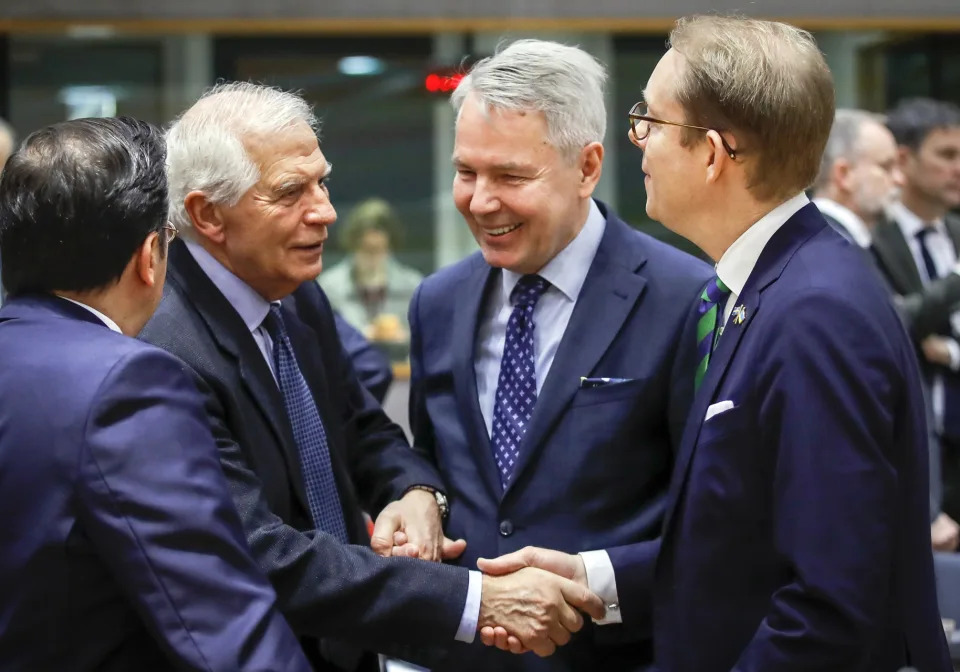he foreign ministers of the European Union (EU) on Monday endorsed new sanctions against 32 individuals and two entities in Iran for the repression of the population, in what is already the fifth round of restrictive measures against the authorities of that country in connection with human rights violations since the death of young Masha Amini.
The new sanctions include Iranian Ministers of Culture and Islamic Guidance, Esmaeili Mohammad Medhi, and Education, Nouri Yousef.
Also the deputy commander of the Islamic Revolution Guards Corps (IRGC) Ali Fadavi and the spokesman Ramezan Sharif of the same entity.
Specifically, the EU has decided to sanction the Minister of Culture because the Ministry has personally and publicly threatened to ban filmmakers for issuing a statement calling for restraint by the authorities cracking down on protesters, and for threatening artists and musicians to stop working for not toeing the official government line.
The decision to sanction the head of education is due to the fact that it considers him responsible for the internment of students in penitentiary centers.
In addition, the EU has also decided to blacklist, among others, deputies, several judges and prosecutors and prison directors in the country.
The two new sanctioned entities are the Foundation for Cooperation of the Disciplinary Force of the Islamic Republic of Iran and the Institute of Police Science and Social Studies.
In total, the list of Iranians sanctioned for human rights violations includes 196 individuals and 33 entities.
Those sanctioned are banned from entering EU territory and all their assets in the EU have been frozen; furthermore, no economic resources may be made available to them.
At the same time, the EU applies to Iran a veto on the export of equipment that can be used for internal repression and to control telecommunications.
Despite the insistence of countries such as Germany, the Council has still not reached an agreement (it has to be unanimous) to consider the Iranian Revolutionary Guard as a terrorist entity.
For this, as the EU High Representative for Foreign Affairs himself, Josep Borrell, has recognized, it would be necessary first of all some judicial decision in that sense in some Member State.
The EU has been denouncing the widespread and disproportionate use of force by Iranian security forces against peaceful demonstrators since the September death of Amini in police custody after she was arrested for allegedly violating the country’s strict dress code.
According to the Oslo-based NGO Iran Human Rights (IHRNGO), the death toll at the hands of Iran’s security forces in recent weeks stands at 326, including 43 minors.
The EU insists that those responsible for the crackdown on the population be held accountable, and has urged the Iranian authorities to ensure that transparent and credible investigations are carried out to clarify the number of deaths and arrests, that all peaceful protesters are released and that due process is ensured for all detainees.
Earlier, the EU has also criticized Iran’s decision to severely restrict internet access and block instant messaging platforms, which it claims flagrantly violates freedom of expression.
Following Amini’s death, the EU assured that it would “explore all options at its disposal” to address his “murder” and the way Iranian security forces have responded to subsequent demonstrations.
In parallel, it is imposing restrictive measures, under another sanctions framework, on Iranian officials for militarily assisting Russia in the invasion of Ukraine.
Brussels has proposed to sanction in the next package of sanctions against Russia for invading Ukraine -the tenth already-, which it expects to see the light of day on Friday, a year after the start of the war, seven other Iranian companies linked to the Revolutionary Guard that manufacture the drones that Tehran is giving to Moscow to bomb Ukraine, and does not rule out increasing the list in the future.

